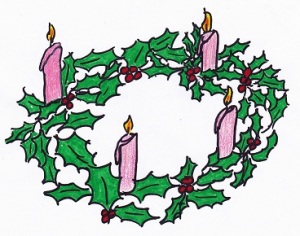 This is a guest post from Anne Christine Jensen of RS Globalization.
This is a guest post from Anne Christine Jensen of RS Globalization.
Some of the most typically Danish Christmas traditions in December are: almost all families have a decoration with a “kalenderlys” (calendar candle) on which we count the days until Christmas Eve.
It’s also a tradition that the families have an Advent decoration with four candles – one for each of the four Sundays until Christmas.
Each evening in December it’s also a tradition for the children (and even some adults) to watch “julekalender” (a special “made for Christmas” series) on the television. There are 24 episodes, one for each day until Christmas Eve. Most years there is also a special made “julekalender” for adults.
In Denmark we celebrate Christmas Eve, the 24th of December. Often families meet in the afternoon and drink coffee together and “hygger sig” (have fun together). In many families it’s a tradition to go to church to a worship in the afternoon too.
In the afternoon it’s also a tradition to see the “Disneys Juleshow: Fra Alle Os til Alle Jer“ (“The Disney Christmas Show: From All of Us to All of You”). The show always shows the same shorts and some clips from films and at the end of the show a sneak peak of new movies or recently released Disney movies are revealed.
In the evening the families eat the well-prepared Christmas dinner together. It’s different from family to family what the traditional Christmas dinner consists of, but some of the most common dinners include one of these meats: “flæskesteg” (pork), duck, goose or turkey. With that we eat white potatoes, sugar glazed sweet potatoes, cabbage and gravy. For dessert the traditional dish is “ris à la mande”, which is cold rice porridge with whipped cream, chopped almonds and warm cherry sauce. One whole almond is put into the rice porridge on one of the plates and the person that gets this almond receives a “mandelgave” (= a present) –it’s often chocolate.
After the dinner and a little pause, the families get ready to dance around the tree. Everyone joins hands in a circle around the tree and while walking around the tree, we sing traditional Christmas songs. When we have finished with the dancing and singing, we start getting the presents. In families with small children “Santa Claus” comes with the presents, but when the children are a bit older, the present are normally just under the Christmas tree and are delegated by a person from the family.
Thanks again to Anne Christine for this post. Anne works at RS_Globalization Services, which provides multilingual translation and localization services to SMEs and corporate clients. RS_Globalization Services is EN15038 certified.
Related posts: How do they celebrate Christmas in France? How do they celebrate Christmas in Germany? How do they celebrate Christmas in Greece?






